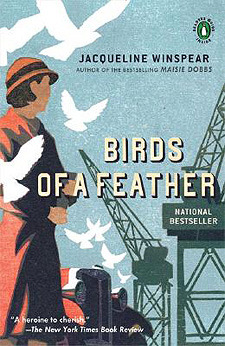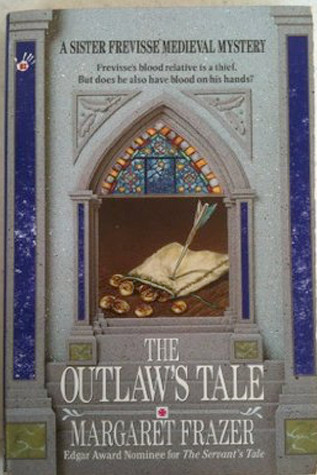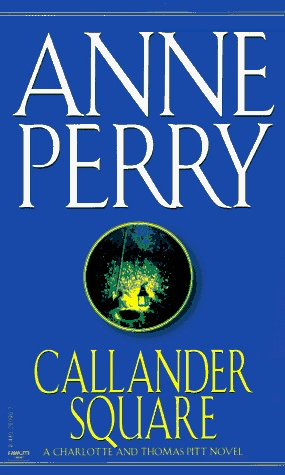I received this book for free from the library in exchange for an honest review. This does not affect my opinion of the book or the content of my review.
Source: the library
The American Agent
by
Jacqueline Winspear
It is part of the Maisie Dobbs #15 series and is a historical mystery, private investigator in a hardcover edition on March 26, 2019 and has 384 pages.
Explore it on Goodreads or Amazon
Other books in this series include [books_series]
Other books by this author which I have reviewed include Maisie Dobbs, Birds of a Feather, Pardonable Lies, Messenger of Truth, An Incomplete Revenge, A Lesson in Secrets, The Mapping of Love and Death, Among the Mad, A Dangerous Place, Journey to Munich, In This Grave Hour, To Die But Once
Fifteenth in the Maisie Dobbs historical private investigator mystery series set in London, 1940, and revolving around a compassionate woman with a brilliant history of detecting, psychology, battlefield nursing, wife, lady, and more.
My Take
War is about loss, and that seems to be a central theme in The American Agent. Loss, that is. With more loss in giving birth, in the loss of friendship, visible wounds, age-old losses, and more.
It’s also a fascinating look at how the English perceived Edward R. Murrow and the controversy his and other correspondents’ reports raised in America. As well as the forces against those correspondents, individualized in Catherine Saxon, a woman who followed her dream, despite the cultural expectations of the times against women. Winspear also raises the specter of medical welfare, i.e., socialized medicine. It’ll be interesting to see where the author goes from here!
This is one of the points I love about Maisie Dobbs (the series), as Winspear addresses a number of historical points that changed during Maisie’s life. And Maisie spearheads those changes, lol, using third person simple subjective point-of-view from Maisie’s perspective. She has quite the unique view, having been raised in a lower class family, but bright enough to want to learn and catch the attention of several influential patrons.
It makes an interesting change from Charles Todd’s Inspector Ian Rutledge series with the inspector hiding his PTSD. Now, twenty-some years later, progress on treating patients and soldiers is being made with Chester noting the psychological issues and McIndoe’s ideas on patient recovery — which I think are brilliant!
Winspear also notes that while men don’t think women should have anything to do with war, women are still involved in it. Too right!!
The propaganda issue with some Americans claiming that what the war correspondents were reporting on the blitzkrieg was made up. Blackmailing news editors to shut down stories that might influence their readers in the “wrong” way. Sounds familiar, doesn’t it?
Winspear also drops some intriguing hints about Maisie’s potential future.
A different kind of show is involved here, and I love the sound of Murrow’s reporting, that “the Americans listening can hear what’s happening on the streets of London” with Murrow telling it so they can see it, feel it.
My biggest niggle is this “romance”. I never twigged to it. So it’s a good thing Winspear out-and-out tells me at the end…
Winspear may want to check that line on page 303 about Mrs Lockwood cleaning for Polly.
The Story
Death and destruction is raining down from the skies of Britain, courtesy of the Luftwaffe, and American correspondents are reporting to the American people. Reporting what they’re seeing, relaying the experience of the British man on the street.
Part of that corps of journalists is the young Catherine Saxon who is found murdered in her London digs. It’s a high profile case that needs to be kept on the low down. And Mark Scott, an American agent, asks for Maisie Dobbs to help him investigate the case.
It’s tricky for Maisie, for she still hasn’t received permission to adopt Anna. Any negative publicity could destroy their chances.
The Characters
Miss D, a.k.a., Maisie Dobbs, Lady Compton, had been a nurse in the last war at a casualty clearing station. Today, she runs a private investigative agency and volunteers with the Auxiliary Ambulance Service at night. Billy Beale is her assistant who works nights with ARP. His wife, Doreen, still suffers from depression. Their children include Billy who has enlisted and is based in Singapore; Bobby who has joined the RAF as an apprentice mechanic; and, Margaret Rose, their youngest. Sandra is married to Lawrence Pickering, a publisher, and Sandra works for Maisie on a part-time basis. They have a son, Martin.
Chelstone Manor is…
…the dower house Maisie inherited from Maurice, which is located on the Comptons’ estate in Kent. Anna Mason is the young girl, a sensitive, from In This Grave Hour, 13, whom Maisie is desperate to adopt. Emma, a giant Alastian, and Jook, a lurcher, adore Anna. Lady is Anna’s pony. Frankie Dobbs is Maisie’s father and married to Brenda, Dr Maurice Blanche’s former housekeeper.
Lord Julian and Lady Rowena Compton are Maisie’s in-laws and are based on the Compton estate in the country. Their son and heir and Maisie’s husband, James, died in a tragic accident. George is their chauffeur. The Reverend Harley is the local vicar. Mr Avis is quite vehemently against the Luftwaffe, lol.
Mrs P, Priscilla Partridge, had been with the First Aid Nursing Yeomanry in WWI and is Maisie’s best friend. She’s married to the one-armed Douglas, a poet who works for the wartime Ministry of Information. They have three sons: Tom is with the air force; Tim lost an arm, being a hero in To Die But Once, 14; and, Tarquin is the youngest who has chosen the path of pacifism. Elinor had been the children’s nanny and now works with the First Aid Nursing Yeomanry and still lives with the Partridges. She’s Family.
Mark Scott is an American agent with the Department of Justice, Bureau of Investigation, whom Maisie met in Journey to Munich, 12. Scott had used Elaine Otterburn as an informant.
Robbie MacFarlane is with Special Branch. Detective Chief Inspector Caldwell, with Scotland Yard, has risen in the world, but he’s still a sarcastic git. Dr Ferguson is the on-duty pathologist. Miss Hawkins is a policewoman.
Welbeck Street is…
…a boarding house where Doris Marsh is the landlady, working for the owners, the overbearing Jonathan and Beryl Tucker. Their son, Jeremy, had wanted to be an artist. Their daughter, Eunice, emigrated to Canada and works as a teacher.
Catherine Saxon is/was a war correspondent, moving from battlefront to battlefront, whether it was actual war or family battles. Senator Clarence Saxon is her isolationist father with a desperate need to control his wayward daughter. Amelia Saxon is her mother and the senator’s second wife and estranged from the senator. The senator’s sons with his first wife, Angelica, are Clarence “Scotty” Saxon, Jr, who works for the government in D.C. and Walter, who is in banking in New York. Scotty is an American airman Cath seems sweet on. Bartholomew Flannery is Amelia’s father, Cath’s maternal grandfather, who owns newspapers. Sanderson Brown is the bore to whom Cath was engaged. Jennifer Standridge Barrington has been Cath’s best friend since childhood. Jenny now lives in London, working as a society reporter, with her banking husband, Miles Barrington. Charlie Barrington is their young son. Miss Barker is Miles’ secretary.
Other tenants at Welbeck Street include Miss Isabel Chalmers, a secretary in Whitehall; Mrs Pamela Lockwood, a smart-dressing widow from the first war who now works as an accountant at Derry and Toms; Polly Harcourt is an actress in the West End who also works as a waitress at Nick’s bar; and, Elizabeth Drake and Helena Richardson — who supposedly have a very intimate relationship — intend to apply as Wrens.
Mr G Chester is an obstetrician who lives across the street from the ladies. Miss Handle is his protective secretary. Dr Archibald McIndoe has some radical ideas about patient recovery.
Reporters
Edward R. Murrow was the pre-eminent American broadcaster in Britain with his London Calling broadcast. Mary Marvin Breckenridge got married a few months back, so she can’t work as a broadcaster with Murrow’s Boys anymore. Bob Walkinshaw is an Australian who stayed on after WWI and is the sound engineer at the BBC.
J.B. Priestly did a BBC broadcast, Postscripts. Vernon Bartlett broadcast for the BBC’s North American Service. Mollie Painter-Downes wrote The New Yorker’s Letter from London. Helen Kirkpatrick was reporting for The Chicago Daily News. Quentin Reynolds was a journalist who wrote a letter to his father. One story was about RAF Flight Officer James “Jimmy” Trahey.
America First is…
…an organization that wants nothing to do with the war. Charles Lindbergh is in the forefront. Joseph Kennedy is the American ambassador to England and very much an American Firster. Seems he’s corrupt in other ways too. President Roosevelt is against them.
Dr Maurice Blanche, a highly regarded doctor of legal medicine and a formidable investigator, had been Maisie’s mentor. Bernard Klein is Maisie’s lawyer. Dr/Mr Andrew Dene is an orthopedic surgeon and another of Maisie’s former loves.
The Auxiliary Ambulance Services is…
…a volunteer organization that collects the wounded while the bombs are flying. Keene and Blake are some of the supervisors on duty. Bunty is the best bus while Alice is heavy on the turns.
Giuseppe “Pippo” has changed his name to Pete and owns a small Italian restaurant, along with his dad, where Scott is a regular. Ricky is one of the waiters. The police believe that Mr and Mrs Horne are suffering blitz nerves. Mrs Van Larsen is a client with fears. Nurse Simpson is quite young at the hospital where Pris starts out at.
Dr Charles Hayden lives in Boston and had been great friends with Simon (Maisie’s first love; Maisie Dobbs, 1). Michael Clifton had also been a Bostonian (The Mapping of Love and Death, 7).
The Cover and Title
The cover is consistent with previous covers with its woodcut styling and definitely depicts the primary setting: the blitzkrieg of London and its devastating effect on the city. The colors are all browns and oranges as searchlights pierce the orange-to-brown gradated sky. Remnants of buildings form a frame around two firemen training a hose on a fire while Maisie stands with her back to us, wearing her volunteer uniform, carrying the child that Pris rescued, a red cross ambulance on her left. At the top is an info blurb in yellow with the author’s name immediately below it in a soft orange, and the title of the book in a softened yellow. Below the title and centered to the right of center is the series information in deep brown. All the text is embossed.
The title is not about the reporter, but The American Agent with whom Maisie gets involved.














